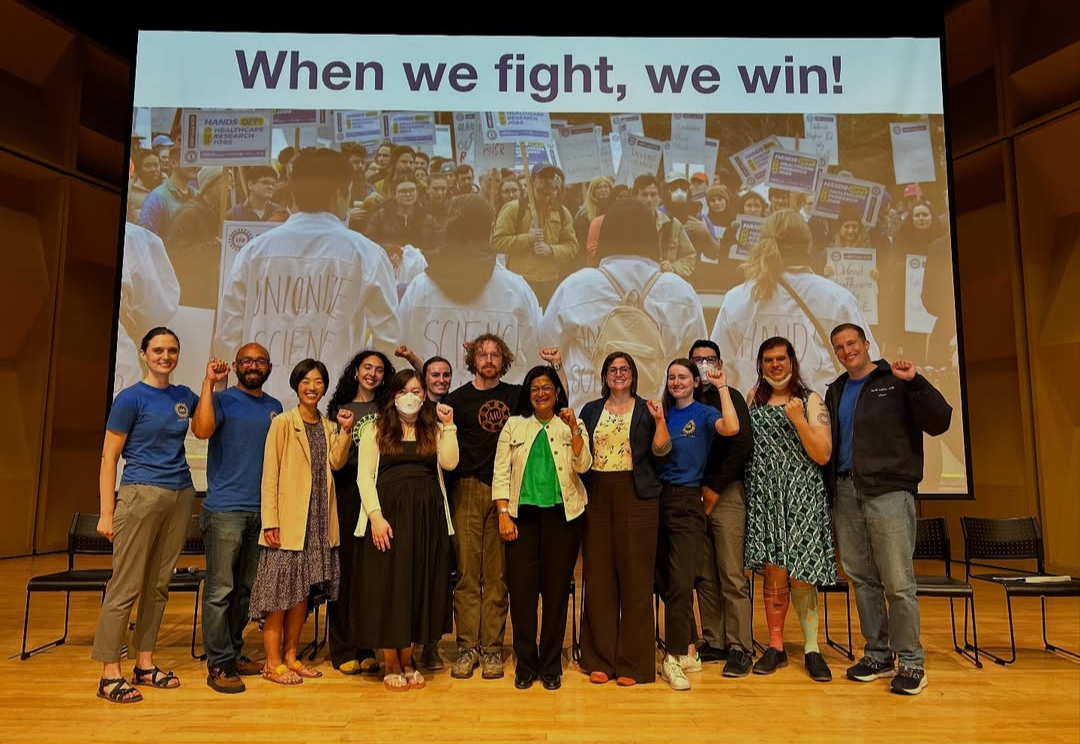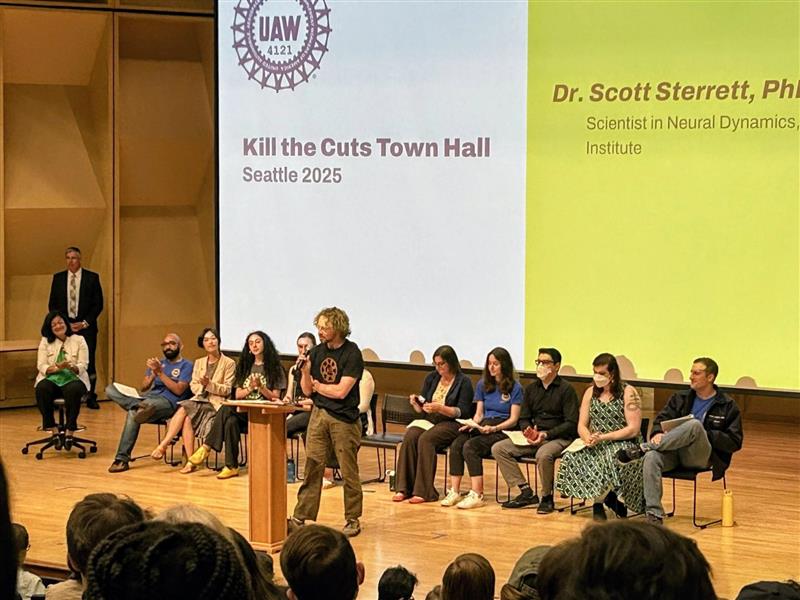Kill the Cuts! UAW Townhall
Kill the Cuts Town Hall!
I joined scientists from across Seattle to fight for science funding that serves the needs of our communities. Rep. Pramila Jayapal joined us to bring the stories and demands back to Washington D.C. in preparation for 2026 budget discussions. I spoke on behalf of my workplace union, Allen Institute United! Our full comments are below.


Good science is unionized science! Money for Jobs and Education Not for War and Deportation!
Allen Institute United Kill the Cuts Town Hall comment:
Hello, my name is Scott Sterrett and I am speaking as a rank and file member on behalf of Allen Institute United, a newly organizing union of science workers at the Allen Institute here in Seattle. I came to Seattle in 2020 for a PhD in Neuroscience at the University of Washington and worked on research and education programs funded by the NIH, NSF, and WA research foundation. It was there that I learned that good science is unionized science as a department steward in UAW 4121. I graduated in 2024 and got a job with the Allen Institute, where our newly formed union campaign, AIU-UAW, represents the hundreds of science workers who make the Allen Institute a leading biomedical research institution.
At the Allen Institute, our mission is to advance our understanding of basic biology and human health. Our workers are building a complete map of the billions of neurons and trillions of synaptic connections in the brain, understanding how our immune system responds to cancer, building synthetic typewriters inside cells to record the developing genome, and much more. These basic science discoveries are made open and available as part of the Institute’s open science mission. For example, this year our Brain Science team published the most comprehensive map of Alzheimer’s disease ever - how many of us in the room have had friends or family diagnosed with Alzheimer’s? Most of the room. Our scientists mapped 3.4 million cells from human brain samples at unprecedented resolution, which provides new insights into how our brains age and provides many new targets for therapies to treat this debilitating disease. All of this work has been made possible through collaborations between private and public funding like the NIH BRAIN initiative and the National Institutes of Aging.
While our institute receives significant private funding, our work still depends on federal funding both within the institute and in the broader Seattle research community. Core facilities in the institute are at risk due to the proposed NIH and NSF overhead caps. Our Alzheimer’s team has had funded grants delayed, diversity supplements have been cancelled, and much of our collaborative work with federally funded groups at UW and Fred Hutch is under threat.
As federally funded research programs have been under attack this year, many scientists have sought out private funding. I want to stress that our scientific ecosystem cannot go backwards to a system where scientific priorities are set by wealthy patrons. In our unionization campaign, we have seen first hand how the board of directors weaponizes the precarity of this funding mechanism to try to keep us from democratically organizing our workplace.
Science that is truly open and innovative must be set by and responsible to the priorities of the people. In the upcoming budget session, we must be bold and demand a budget that represents the priorities of the people through increased funding to the NIH and the NSF. If our budget is a set of moral priorities, as Rep Jayapal said, we must ask why our country can find 1.1 trillion dollars for the Department of the Defense budget while we fight for scraps to fund human health, climate, and education, medicare, affordable housing, and so many more progressive programs.
The hundreds of workers in this room and the thousands in your district are here to say increase funding for science and also to fight for a workplace where we can do innovative and open science free from pollution, workplace discrimination, ICE raids, and much more.
Money for Jobs and Education Not for War and Deportation!
Kill the Cuts Town Hall!
I joined scientists from across Seattle to fight for science funding that serves the needs of our communities. Rep. Pramila Jayapal joined us to bring the stories and demands back to Washington D.C. in preparation for 2026 budget discussions. I spoke on behalf of my workplace union, Allen Institute United! Our full comments are below.
Good science is unionized science!
Money for Jobs and Education, Not for War and Deportation!
Allen Institute United Kill the Cuts Town Hall Comment:
Hello, my name is Scott Sterrett, and I am speaking as a rank-and-file member on behalf of Allen Institute United, a newly organizing union of science workers at the Allen Institute here in Seattle.
I came to Seattle in 2020 for a PhD in Neuroscience at the University of Washington and worked on research and education programs funded by the NIH, NSF, and WA Research Foundation. It was there that I learned that good science is unionized science as a department steward in UAW 4121. I graduated in 2024 and got a job with the Allen Institute, where our newly formed union campaign, AIU-UAW, represents the hundreds of science workers who make the Allen Institute a leading biomedical research institution.
At the Allen Institute, our mission is to advance our understanding of basic biology and human health. Our workers are:
- Building a complete map of the billions of neurons and trillions of synaptic connections in the brain.
- Understanding how our immune system responds to cancer.
- Building synthetic typewriters inside cells to record the developing genome.
- And much more.
These basic science discoveries are made open and available as part of the Institute’s open science mission. For example, this year, our Brain Science team published the most comprehensive map of Alzheimer’s disease ever. How many of us in the room have had friends or family diagnosed with Alzheimer’s? (Most of the room.)
Our scientists mapped 3.4 million cells from human brain samples at unprecedented resolution, providing new insights into how our brains age and offering many new targets for therapies to treat this debilitating disease. All of this work has been made possible through collaborations between private and public funding, like the NIH BRAIN Initiative and the National Institutes of Aging.
The Threat to Science Funding
While our institute receives significant private funding, our work still depends on federal funding both within the institute and in the broader Seattle research community. However, this funding is under threat:
- Core facilities in the institute are at risk due to the proposed NIH and NSF overhead caps.
- Our Alzheimer’s team has had funded grants delayed.
- Diversity supplements have been canceled.
- Much of our collaborative work with federally funded groups at UW and Fred Hutch is under threat.
As federally funded research programs have been under attack this year, many scientists have sought out private funding. I want to stress that our scientific ecosystem cannot go backwards to a system where scientific priorities are set by wealthy patrons. In our unionization campaign, we have seen firsthand how the board of directors weaponizes the precarity of this funding mechanism to try to keep us from democratically organizing our workplace.
A Call to Action
Science that is truly open and innovative must be set by and responsible to the priorities of the people. In the upcoming budget session, we must be bold and demand a budget that represents the priorities of the people through increased funding to the NIH and the NSF.
If our budget is a set of moral priorities, as Rep. Jayapal said, we must ask:
Why can our country find $1.1 trillion for the Department of Defense budget while we fight for scraps to fund human health, climate, education, Medicare, affordable housing, and so many more progressive programs?
The hundreds of workers in this room and the thousands in your district are here to say:
Increase funding for science!
Fight for a workplace where we can do innovative and open science free from pollution, workplace discrimination, ICE raids, and much more.
Money for Jobs and Education, Not for War and Deportation!